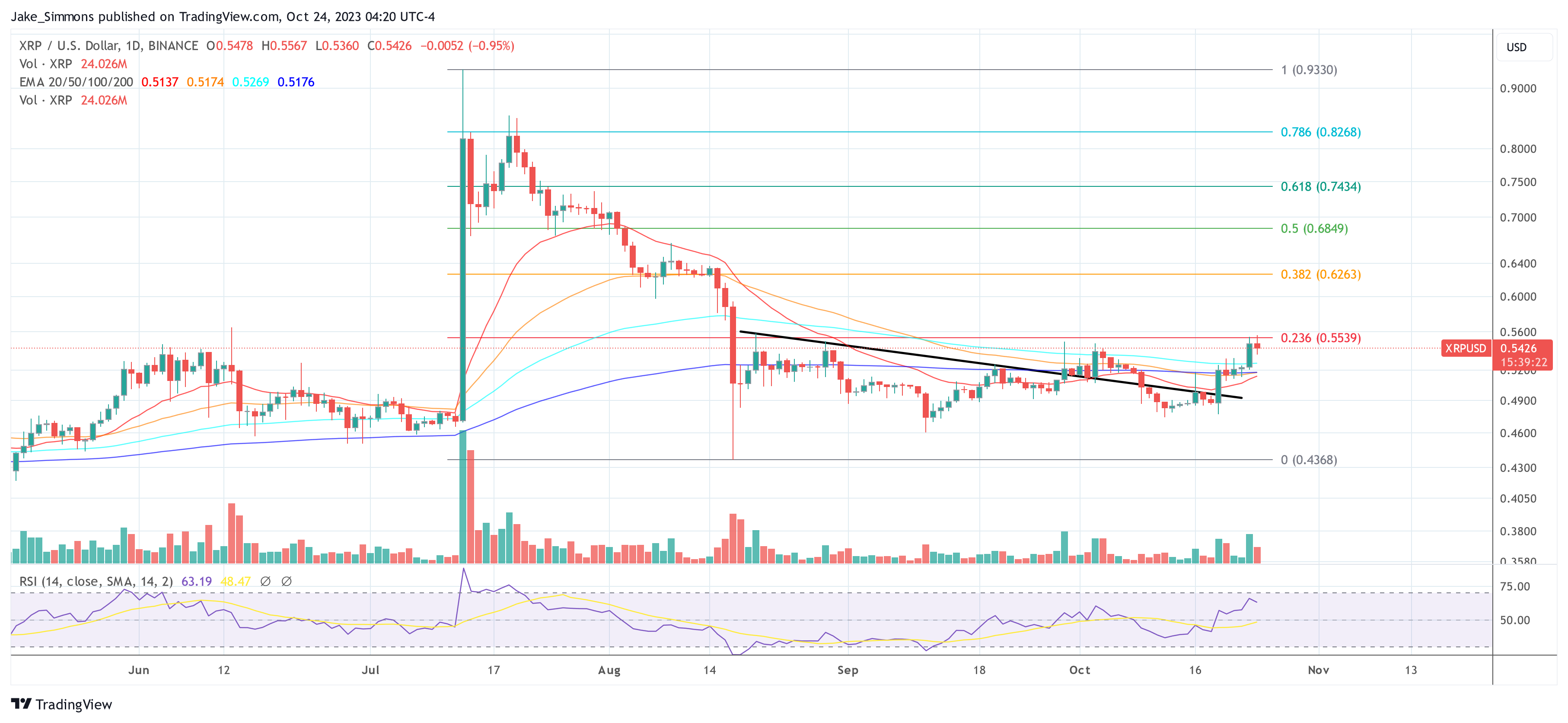On Monday, October 23, 2023, US District Judge Analisa Torres signed an order that formally dismissed the US Securities and Exchange Commission’s (SEC) case against Ripple executives Brad Garlinghouse and Chris Larsen. With this landmark order, the claims levied by the SEC against these Ripple figures are terminated in their entirety, marked with prejudice, ensuring that similar claims cannot be brought against them in the future over the same matter.
#XRPCommunity #SECGov v. #Ripple #XRP BREAKING: JUDGE TORRES SIGNS ORDER OFFICIALLY DISMISSING CASE AGAINST BRAD GARLINGHOUSE AND CHRIS LARSEN pic.twitter.com/TLXG51hSlP
— James K. Filan
(@FilanLaw) October 23, 2023
What This Means For The Ripple Execs
Fred Rispoli, a known pro-XRP attorney and senior managing partner at Hodl Law, provided an analysis of the dismissal order. He highlighted that the judge’s order of dismissal was exceptionally precise in its scope. It referred exclusively to “Institutional Sales” of XRP by Ripple executives and omitted the other two categories: “Programmatic Sales” and “Other Distributions.”
This, Rispoli argues, was a strategic decision. While the dismissal grants Garlinghouse and Larsen protection from being pursued by the SEC concerning Institutional Sales, thanks to the ‘with prejudice’ condition, it does not offer the same shield for the other two categories. This essentially means that if the SEC decided to appeal and subsequently managed to reverse the court’s decision on “Programmatic Sales” and “Other Distributions,” the executives could find themselves back in the legal crosshairs.
Drawing attention to this peculiarity, Rispoli posited, “If the SEC manages a win on its appeal, their hands would be tied in terms of pursuing any further action regarding Institutional Sales. However, the absence of a comprehensive dismissal spanning all sales categories could be a double-edged sword.” He seemed to suggest that Garlinghouse and Larsen might have achieved a more robust legal safeguard if all types of XRP sales had been included in the dismissal.
Summarizing his analysis, Rispoli stated:
Point: If I were Brad Garlinghouse and Chris Larsen, I would have demanded dismissal of ALL claims, not limiting it to Institutional Sales only. If the SEC appeals and overturns ruling on other sales, SEC can still sue BG and CL on those two other categories
Engaging in the dialogue, Roisin The XRP Queen, a prominent figure in the community, subtly hinted at the possibility of behind-the-scenes negotiations or agreements that might play a pivotal role in future developments. Rispoli agreed, emphasizing that any possible appeal by the SEC would only be of significant concern if there weren’t undisclosed agreements in motion.
“Exactly. Not including the other two categories in the dismissal only becomes a problem if there is an appeal by the SEC,” remarked the attorney.
Crucial Details
The genesis of this litigation harks back to December 22, 2020. The SEC, in its official complaint, alleged that Garlinghouse and Larsen had unlawfully funneled finances into Ripple via the sale of unregistered XRP, particularly targeting institutional investors. Ripple’s XRP sales activities were classified into three distinct categories: institutional, programmatic, and other distributions.
Judge Torres, in a pivotal ruling, demarcated the sales, stating that only the institutional sales infringed upon the law. This distinction absolved the programmatic sales and other distributions from being deemed unlawful. Such a determination had initially paved the way for a focused trial on institutional sales set for the next year. But, in light of the SEC’s recent decision to retract its charges, that scheduled trial has evaporated.
With the latest turn of events, the crypto and legal spheres are buzzing with conjectures about the SEC’s perspective maneuvers. A prevailing sentiment, resonated by Rispoli and several other legal analysts, is that the horizon might herald a settlement between the SEC and Ripple. However, it is important to note that the SEC still has the prerogative to appeal after the final ruling.
At press time, XRP traded at $0.5426.

 (@FilanLaw)
(@FilanLaw) 